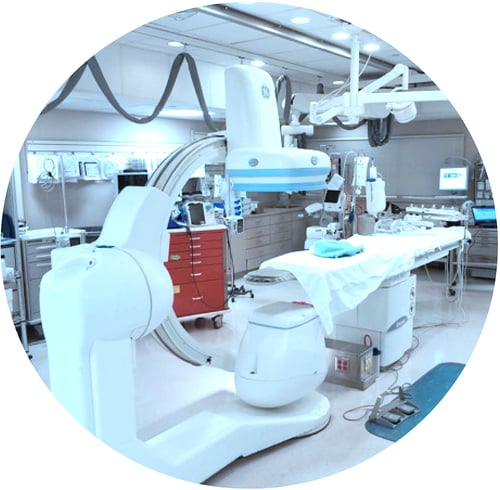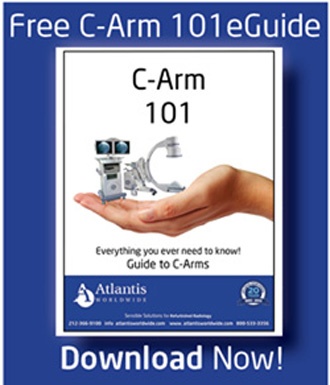Hybrid Cath Labs combine traditional diagnostic functions of a Cath lab with surgical functions usually found only in an operating room. Unless you are building your hybrid Cath lab from the ground up, oftentimes Cath labs are placed in locations adjacent to surgical suites. However, it’s now common for interventional specialists to have hybrid facilities.
Unless you are building your hybrid Cath lab from the ground up, oftentimes Cath labs are placed in locations adjacent to surgical suites. However, it’s now common for interventional specialists to have hybrid facilities.
Hybrid Cath labs are especially popular with interventional cardiologists, neuro surgeons, cardiac surgeons and vascular surgeons. Procedures that are well suited for hybrid Cath labs including peripheral stenting, abdominal aortic aneurysms, percutaneous valve repair, minimally invasive direct coronary artery bypass and aneurysm coiling.
It’s important to note that the design and construction of a hybrid Cath lab is not as simple as just combining a Cath lab and OR. Here are three areas on which to focus if your goal is to have a hybrid Cath lab at your healthcare facility.
A Team Approach
If you want a successful implementation of a hybrid Cath lab, a team approach is essential. Your architects and planners will need to understand the roles of each team member and find ways to balance the requirements of both surgeons and the Cath lab professionals. Staffing will include teams in cardiology, surgery, anesthesiology, electrophysiology, perfusion, echo, nursing and support staff. The entire team must be committed to serving patients in an innovative way. By providing both the ability to diagnose cardiac conditions and then quickly providing surgical procedures to patients, your facility will provide a clear benefit and advantage. Your whole team must be in sync with that goal.
Careful Planning
When planning your hybrid Cath lab, many things must be considered, including the location of your equipment, HVAC, vibration and radiation exposure.
Vibration testing is necessary because the bi-plane is very sensitive. Mitigation may be required. Vibration sources from inside the facility could include fan units near the lab. In a perfect world, you’ll eliminate vibration at the source. However sometimes vibration isolation techniques may be required.
Where the equipment is located is also important. Because each clinical discipline needs a different set of equipment in the hybrid lab, there can be conflicts over space and placement. It’s important to provide compromise locations that still offer efficient use of the required equipment. Your engineering staff can predict and plan for facility issues including power, HVAC and other building infrastructure services.
Of course, radiation is a constant concern in Cath labs and it’s even more important in a hybrid Cath lab. In a hybrid lab, all personnel will be required to wear aprons during any procedure requiring even minimal amounts of concurrent imaging, including surgeons. In addition, a radiation safety specialist will determine how the lab must be shielded. As a rule, radiation protection will be provided by mass, most likely by lining the walls with lead panels.
A hybrid lab will also need additional ventilation and cooling systems. Because everyone will need to wear aprons, lower air temperatures may be required. Lower temperatures are also used to control patient metabolism during surgery.
Smart Design
Existing Cath labs usually have insufficient space for hybrid procedures. A bi-plane unit requires specific vertical space requirements, which include a ceiling height of 9’6”-9’9”. If your medical center was built with an interstitial floor, it’s easier to make the insertion of a hybrid Cath lab.
When designing a hybrid Cath lab, cabling, wiring and hoses must be off the floor in order to facilitate housecleaning and prevent tripping hazards. Every component must be placed carefully. Be sure to plan discuss thoroughly with your vendors that will be installing your equipment.
During construction, the highest Infection Control Risk Assessment controls must be followed. Those in adjacent spaces will need to know that renovations will be disruptive—including noise, utility shut-down coordination and access during construction.
With proper planning, you can create an ideal hybrid Cath lab that provides concurrent diagnosis and treatment of patients needing cardiac procedures. The result will be a more effective facility that serves patients exceptionally well.
Talk To An Expert
If you have questions about hybrid Cath labs or need medical imaging equipment for yours, talk to the experts at Atlantis Worldwide. We’re happy to provide guidance and help you find the right equipment at the perfect price.
To find out more, contact Atlantis Worldwide Today!
Some blogs you may have missed:
- Top 10 Tips for the Operating Theater Radiographer
- Single-Plane Or Bi-Plane Cath Labs: Which Is Right For You?
- Keeping Your Cath Lab Cool
- Comparing The GE Innova Digital Cath Lab Family: 2100, 3100 & 4100
- Top 7 C-Arms for Your Orthopedic Practice
About the author: Vikki Harmonay



